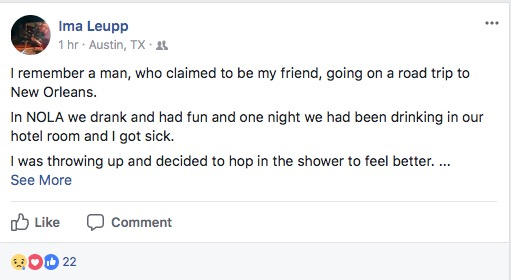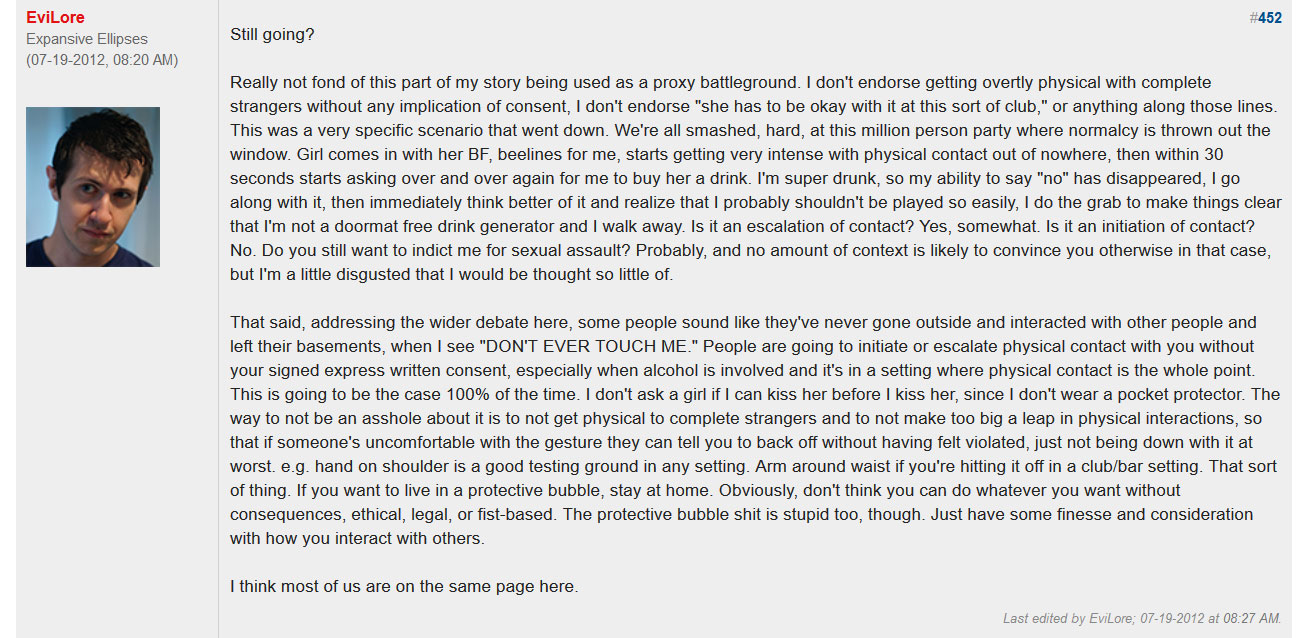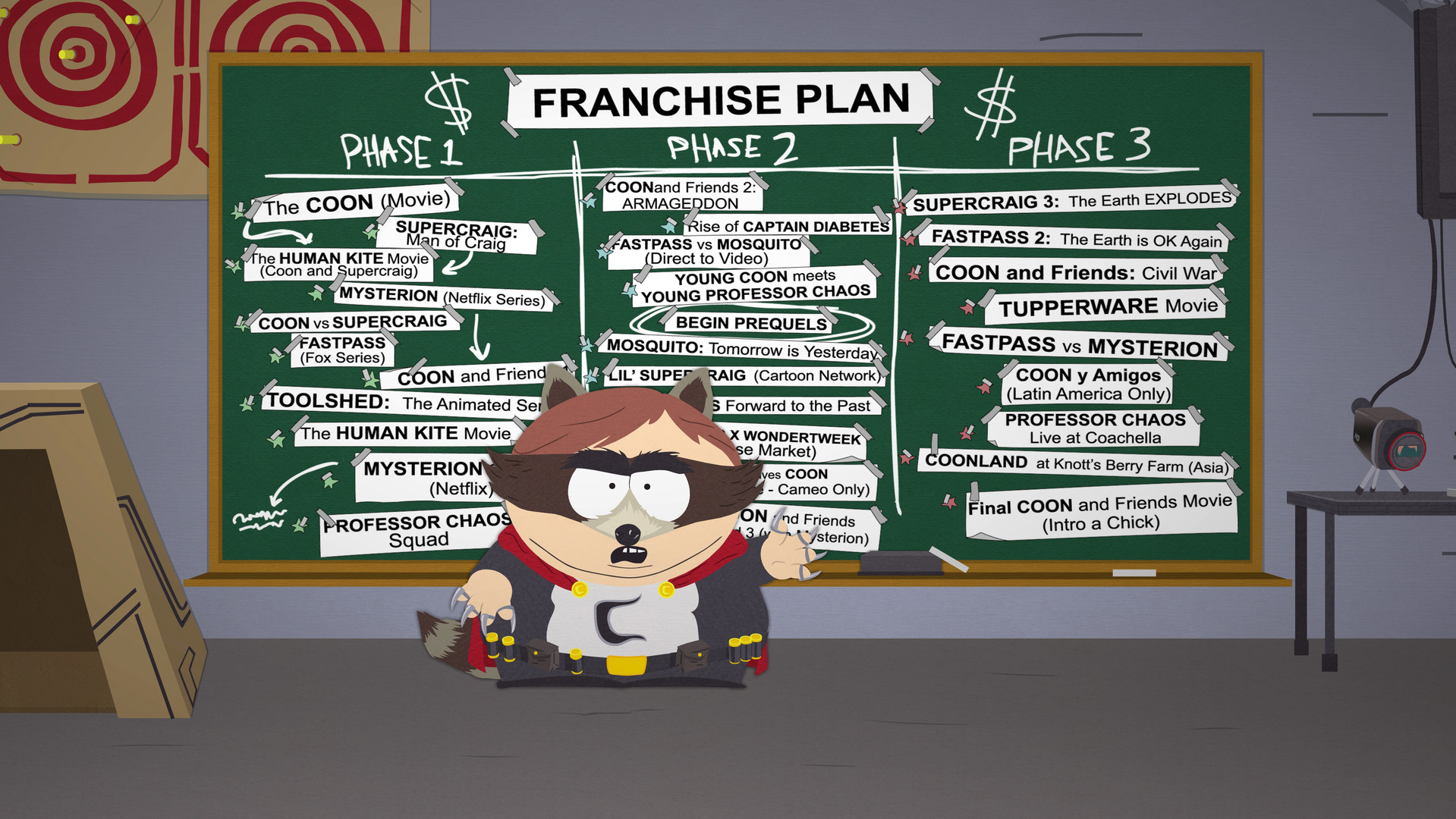After speaking with NeoGAF's owner, the woman behind the allegations, and a number of moderators, a messy picture about gaming's watercooler forum emerges.
Image courtesy of NeoGAF
Over the weekend, one of the most popular video game forums, NeoGAF, suddenly went offline. Following allegations of sexual misconduct by the site's owner, Tyler Malka, many of the message board's moderators quit in protest, threads referencing the allegations were deleted, and NeoGAF's users began revolting in protest. NeoGAF is back online, as of this writing, but remains "down for maintenance."
While there are countless places to discuss video games on the Internet, NeoGAF has been one of the more common melting pots, a place for fans, developers, and critics to talk among one another. It's been around for 18 years. The "neo" part comes from splintering off from Gaming-Age, a once-influential video game website from the 90s. GAF originally stood for Gaming-Age Forums. Now, it's just part of the board's long history. (Full disclosure: More than a decade ago, I wrote for Gaming-Age, and was part of the forum's moderation staff.)
After speaking with Malka, the woman who made the original allegations, and a number of moderators who helped run NeoGAF, a messy and uncomfortable picture emerges.
A Story Among Close Friends
The allegations against Malka stem from a series of Facebook posts by Texas filmmaker Ima Leupp, who was sharing stories of sexual harassment she has faced in her life and career as part of the "Me Too" campaign that has become so prominent in the wake of the serious allegations against Harvey Weinstein. ("Me too" was not actually started by actress Alyssa Milano, but is merely the latest iteration of an awareness campaign started more than a decade ago.)
Leupp did not name Malka in her original posts, telling the story of "a man, who claimed to be my friend" while on a road trip to New Orleans in April 2015. When people asked in the comments on her post about one of the men she was talking about, she told people to "Google Evilore" in the comments. On the Internet, and on NeoGAF, Malka goes by the pseudonym EviLore.

Leupp claimed the two had been heavily drinking, and she later became sick in a hotel room. While cleaning up in the shower, he approached her "fully naked" from behind.
"I had a boyfriend at the time and didn't think I had given him any reason to believe I wanted this," she said in the post. "I don't cheat. So I told him that it wasn't ok, that I was sick, that I had a boyfriend, that I didn't want that."
Leupp alleges Malka "started resenting me," and became "mean" during their trip to the city. Her relationship with her boyfriend reportedly fell apart soon after, which she blamed in part because of the guilt she felt over the incident with Malka.
The two had worked together in the past; Malka was an actor in one of her shoots, earlier in 2015. Over the weekend, Leupp forwarded a call sheet for the shoot to me, listing Malka as "thug 1."
"I couldn't come out about this situation because the perpetrator is a semi-famous man who would have retaliated and I couldn't afford to defend myself," she said.
In fact, she did not make the allegations public. Instead, friends took screen shots of the post and they began circulating, eventually becoming public and going viral.
"I never meant to out him publicly. I never meant to have any of this happen. It was a story that had come up. Instead of just reposting a hashtag, I thought if I described some more details of certain situations that it would become more real for friends in my life."
Malka has not publicly commented on the allegations, but in a series of email exchanges with me over the weekend, he pushed back against the story. The two have not spoken in years, according to Malka. He called Leupp "a deeply disturbed, malicious individual," a characterization Leupp, in an interview with me today, attributed to Malka's attempts to gaslight people over his own behavior.
"It's been a perfect storm of misanthropy and opportunism," said Malka, who described the accusations as "totally ridiculous and baseless."
As for the incident described by Leupp, Malka called it "totally harmonious and consensual."
Leupp, however, said she made no indication the night was to turn sexual.
"I pretty clearly remember closing the door," she said, "maybe not closing it all the way, but closing it enough so that I was protected. I wasn't getting naked in front of him and then going 'Oh, I'm going to puke. You wanna come in the shower with me? That's fucking gross."
She called his insistence that such an advance was consensual "delusional."
Malka further criticized Leupp for reportedly taking down her Facebook post, after the allegations began circulating, as evidence she was making the story up or exaggerating certain details of the encounter. Leupp told me that's not the case; instead, the post was made private so people would stop screen grabbing it and sharing it around online, as her profile also included other posts detailing other sexual misconduct she'd experienced.
"I didn't delete it out of shame or anything, I just got afraid," she told me. "I never meant to out him publicly. I never meant to have any of this happen. It was a story that had come up. Instead of just reposting a hashtag, I thought if I described some more details of certain situations that it would become more real for friends in my life."
She never had any intention of speaking with (or about) Tyler again, but she also hasn't been to work since the allegations became public; she's been concerned for her safety.
Leupp said that, at the time, she was polyamorous and in an open relationship with a boyfriend, but the open part of her relationship was exclusive to women, not men. Leupp said her boyfriend knew and trusted Malka.
The two continued to hang out, according to Leupp, because she attributed the incident to him "being drunk that one night." They talked about how what happened was "not okay," and he seemed receptive to the feedback.
"I had no reason not to trust him still," she said. "It was a creepy thing, but I tend to give people second chances. He had already invited me to go to E3."
Malka and Leupp did have consensual sex one time after the shower incident.
Their next major interaction came later that year, during their E3 trip to Los Angeles. Malka rented an AirBnB for friends to stay at during the week, and claims that their mutual acquaintances knew Malka's and Leupp's relationship was sexual, as they were sharing a bed. But Leupp disputed the sexual nature of the relationship, and while they were sharing a bed, they never had sex at E3.
"I think he felt rejected, and started pursuing this other girl," she said.
According to Malka, he was upfront about a "mutual romantic interest" also coming on the trip, and it "might lead somewhere." He claims an early interaction between the other woman and Malka proved explosive, and resulting in Leupp becoming "increasingly hostile and bitter. He claims she had "two separate public mental breakdowns" before the trip was over. These breakdowns, insisted Malka, were related to a "history of serious mental illness."
Leupp called both of these insinuations "bullshit." Her confrontations with Malka over the weekend were, according to her, because Malka became aggressive towards her. Leupp was also increasingly uncomfortable over how he was pursuing this other girl, by "trying to get her drunk, being really hands-y, taking her away from the group a lot, and isolating her."
Malka argues that her accusations against him are a product of the hostility that developed over this E3 trip. "This Facebook post allegation she posted a few days ago is the story she first invented for startlingly petty and malicious reasons during that whole love triangle situation years ago," he said.
Their relationship splintered at the end of the E3 trip, while at the airport and heading home. The tensions from the past week surfaced, and Leupp called Malka "rape-y" and described his actions as "inappropriate." The two blocked one another on social media soon after.
A History of Questionable Actions
This isn't the first time Malka has been criticized over possible sexual misconduct, a situation in which Malka offered a confusing set of explanations for his behavior and ideas of consent. In 2012, Malka was travelling the world and sharing stories about the journey on a NeoGAF thread. A user started a thread after reading a passage where Malka discussed touching a woman:

"At one point in a bar a girl who didn't speak any English came up to me and started flirting heavily, then went straight into asking me to buy her a drink, as Itxaka translated when I didn't know what the hell was going on. I laughed, because drinks here were all of two Euros, but consented and then grabbed her ass hard to show that I wasn't being taken advantage of, and she thought better of treating me as a mark and left without taking her drink."
"She started the grabbing. We were joking and laughing about the whole thing and I saw her later that night and the joking and laughing continued.The outraged feminist posturing in this thread couldn't be further from the truth."
In response, Malka attempted to defend himself by saying it was a "very specific scenario that went down" where everyone was "smashed, hard, at this million person party where normalcy is thrown out the window," and the woman initiated the act of physical contact. However, in this post and others, Malka goes beyond simply describing one specific incident by offering his beliefs on consent, and why it felt comfortable that he "grabbed her ass hard."
"I do the grab to make things clear that I'm not a doormat free drink generator and I walk away," he said at the time. "Is it an escalation of contact? Yes, somewhat. Is it an initiation of contact? No. Do you still want me to indict me for sexual assault? Probably, and no amount of context is likely to convince you otherwise in that case, but I'm a little disgusted that I would be thought so little of."
When pressed about the incident, and how it looked in light of the latest allegations, Malka called the situation "an extremely poorly worded couple sentences fumbling through in a passage about the events of that day." His description of the events in Spain became far less aggressive, calling it a "cutesy and playful exchange," rather than an act of power to show his dominance. These two characterizations that Malka made of this night could not have been more inconsistent or different from one another.
Malka claims the incident was exaggerated to defame him, a consequence of NeoGAF's strong opposition to GamerGate, even though it was thoroughly discussed on NeoGAF itself.
(It's true NeoGAF took an early and strict stance against GamerGate rhetoric, frequently banning and locking threads that entertained its arguments. Many of the first places Malka's allegations were discussed occurred in GamerGate-friendly online spaces.)
Due to this hostile relationship between GamerGate and NeoGAF, some wondered if the new allegations against Malka were fabricated as part of an attempt by GamerGate-friendly individuals to trick users. Several moderators I spoke to said this was the initial reaction internally, as well. It was a regular occurrence to have users "sacrifice" their accounts by posting inflammatory comments, knowing full well they'd be banned.
"Internet drama isn't new to NeoGAF, but when the allegation is that the site owner sexually harassed someone, and it is allowed to spiral out of control to a point where it's a really bad look."
All the moderators I spoke to asked to be anonymous, citing a fear of harassment and doxxing, both of which have been rampant among NeoGAF's staff, prior to this incident.
When the allegations surfaced, one moderator told me Malka quickly denied them. But as a chorus of legitimate questions surfaced, even the moderation staff wanted more answers. In a private Slack channel for moderators, Malka said a public statement was coming.
"Internet drama isn't new to NeoGAF," said one moderator, "but when the allegation is that the site owner sexually harassed someone, and it is allowed to spiral out of control to a point where it's a really bad look, it's hard to justify sticking around without a knowing that there's a clear plan ahead. Not knowing how this would move forward is what sealed the deal for me. It's impossible to moderate the forum in future in good faith when I'm unable to honestly answer valid questions people might have about this matter."
The wait is what prompted this mod, and many others, to quit.
"Hours went by, no statement," said another moderator. "Other mods were starting to complain about how much crap they were receiving off-site. It was starting to seem really familiar. Scrolling further down, no statement."
It was familiar because NeoGAF had not-so-recently been embroiled in another firestorm.
In June 2017, a NeoGAF user and former mod, Amir0x, was arrested on child porn charges. The police reportedly found "53 images and one video of child porn on Goldberg's cell phone, as well as evidence of him downloading child porn on a laptop computer." The videos apparently depicted children as young as four years old.
"At that time," said one moderator, "news came in fast and we as a staff together decided to try to contact [Malka] and let him formulate a statement, because it's his site and all of that. It took quite a while to get in contact with him, and once he did, he dawdled on writing a statement. The statement he did put out ended up being far, far less than any of us had hoped for, and actually ended up putting crosshairs on some of us."
Malka's statement on Amir0x can be read in full here, which claims nobody knew Amir0x's real name, an explanation for why it took so long for the board to make an official statement on him. One moderator called that claim "patently false" and "the users knew it was crap."
Moderators weren't allowed to make any follow-up statements, resulting in understandable criticism over why the board would make such a milquetoast statement over its own history.
"I very nearly resigned back then," said the moderator. "I think many of us did. I still am not sure why I didn't. I guess it's because GAF itself is still very important to me, even now."
Worried over another Amir0x incident and the potential for doxxing and harassment, one moderator quit after another. When asked about the exodus, Malka shouldered little of the responsibility, and instead pointed at how a "witch hunt" was being carried out to try and tarnish him and NeoGAF.
"A significant portion of the team stepped down in response to [the allegations]," said Malka, "and the rest of the negativity this year hitting a breaking point. 2017 has been depressing and toxic for moderation of social and political issues on a message board that's supposed to be primarily about video games. I totally understand, and I don't blame any of them for parting ways."
Nobody Knows What's Next
The future of NeoGAF is unclear. All sorts of NeoGAF alternatives have been popping up, but an heir to the throne is unlikely to emerge so quickly. Just moments ago, Malka told me NeoGAF should be fully operational later this evening, and in the near future, will be restructured to more exclusively focus on video games. NeoGAF will apparently move "away from the increasingly untenable off-topic discussions that made 2017 such a stressful year for everyone."
"As for me, I have no reason to go hide under a rock," he said. "I'll be at the helm as I always have."
It remains strange that Malka's first public comments on the allegations came to a reporter, rather than the community itself. More than 48 hours after questions were raised, Malka still hasn't said a word on social media. A pattern begins to emerge: Malka was slow and awkward to respond to the revelation that one of its own moderators, an outspoken progressive, was a pedophile, and Malka was slow and awkward to respond to allegations made about his own conduct.
This is in character with what moderators I spoke to described as Malka's "hands-off" style of management when it came to on site policy—except for in cases where it suited him.
"There was historically a lot of dissatisfaction with cases where he overrided us, made policy on a whim, or did things that we had to answer for," said one moderator.
Ultimately, it may be Malka's own action (or inaction) that leads to NeoGAF's demise.
The woman who came forward, though, simply wants to move on with her life.
"The only thing I gain from this is harassment," said Leupp. "I'm not trying to ruin his life. I wasn't trying to call him out. I was responding to a fucking hashtag about sexual assault and sexual abuse, and that story fit really well. Who gets into a shower with a naked girl who's puking?"
Follow Patrick on Twitter. If you have a tip or a story idea, drop him an email: patrick.klepek@vice.com.


